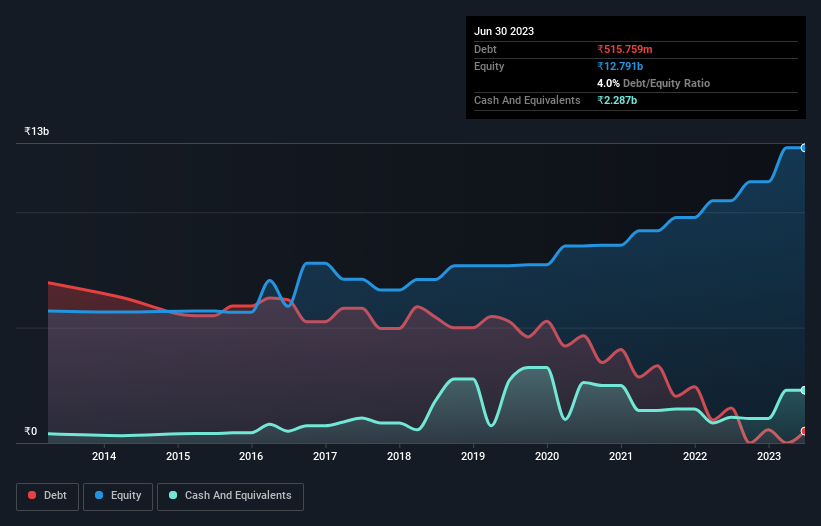
Some say volatility, rather than debt, is the best way to think about risk as an investor, but Warren Buffett famously said that 'Volatility is far from synonymous with risk.' When we think about how risky a company is, we always like to look at its use of debt, since debt overload can lead to ruin. We can see that Elecon Engineering Company Limited (NSE:ELECON) does use debt in its business. But the real question is whether this debt is making the company risky.
What Risk Does Debt Bring?
Debt assists a business until the business has trouble paying it off, either with new capital or with free cash flow. In the worst case scenario, a company can go bankrupt if it cannot pay its creditors. However, a more common (but still painful) scenario is that it has to raise new equity capital at a low price, thus permanently diluting shareholders. Of course, debt can be an important tool in businesses, particularly capital heavy businesses. When we think about a company's use of debt, we first look at cash and debt together.
View our latest analysis for Elecon Engineering
What Is Elecon Engineering's Net Debt?
As you can see below, Elecon Engineering had ₹515.8m of debt at March 2023, down from ₹1.51b a year prior. However, it does have ₹2.29b in cash offsetting this, leading to net cash of ₹1.77b.

How Strong Is Elecon Engineering's Balance Sheet?
According to the last reported balance sheet, Elecon Engineering had liabilities of ₹3.52b due within 12 months, and liabilities of ₹1.00b due beyond 12 months. Offsetting these obligations, it had cash of ₹2.29b as well as receivables valued at ₹3.56b due within 12 months. So it can boast ₹1.32b more liquid assets than total liabilities.
This state of affairs indicates that Elecon Engineering's balance sheet looks quite solid, as its total liabilities are just about equal to its liquid assets. So while it's hard to imagine that the ₹100.9b company is struggling for cash, we still think it's worth monitoring its balance sheet. Succinctly put, Elecon Engineering boasts net cash, so it's fair to say it does not have a heavy debt load!
On top of that, Elecon Engineering grew its EBIT by 52% over the last twelve months, and that growth will make it easier to handle its debt. There's no doubt that we learn most about debt from the balance sheet. But it is future earnings, more than anything, that will determine Elecon Engineering's ability to maintain a healthy balance sheet going forward. So if you're focused on the future you can check out this free report showing analyst profit forecasts.
Finally, while the tax-man may adore accounting profits, lenders only accept cold hard cash. While Elecon Engineering has net cash on its balance sheet, it's still worth taking a look at its ability to convert earnings before interest and tax (EBIT) to free cash flow, to help us understand how quickly it is building (or eroding) that cash balance. During the last three years, Elecon Engineering generated free cash flow amounting to a very robust 98% of its EBIT, more than we'd expect. That puts it in a very strong position to pay down debt.
Summing Up
While it is always sensible to investigate a company's debt, in this case Elecon Engineering has ₹1.77b in net cash and a decent-looking balance sheet. And it impressed us with free cash flow of ₹2.6b, being 98% of its EBIT. So we don't think Elecon Engineering's use of debt is risky. Another factor that would give us confidence in Elecon Engineering would be if insiders have been buying shares: if you're conscious of that signal too, you can find out instantly by clicking this link.
When all is said and done, sometimes its easier to focus on companies that don't even need debt. Readers can access a list of growth stocks with zero net debt 100% free, right now.
Valuation is complex, but we're here to simplify it.
Discover if Elecon Engineering might be undervalued or overvalued with our detailed analysis, featuring fair value estimates, potential risks, dividends, insider trades, and its financial condition.
Access Free AnalysisHave feedback on this article? Concerned about the content? Get in touch with us directly. Alternatively, email editorial-team (at) simplywallst.com.
This article by Simply Wall St is general in nature. We provide commentary based on historical data and analyst forecasts only using an unbiased methodology and our articles are not intended to be financial advice. It does not constitute a recommendation to buy or sell any stock, and does not take account of your objectives, or your financial situation. We aim to bring you long-term focused analysis driven by fundamental data. Note that our analysis may not factor in the latest price-sensitive company announcements or qualitative material. Simply Wall St has no position in any stocks mentioned.
About NSEI:ELECON
Elecon Engineering
Manufactures and sells power transmission and material handling equipment in India and internationally.
Flawless balance sheet with proven track record and pays a dividend.
Similar Companies
Market Insights
Community Narratives



